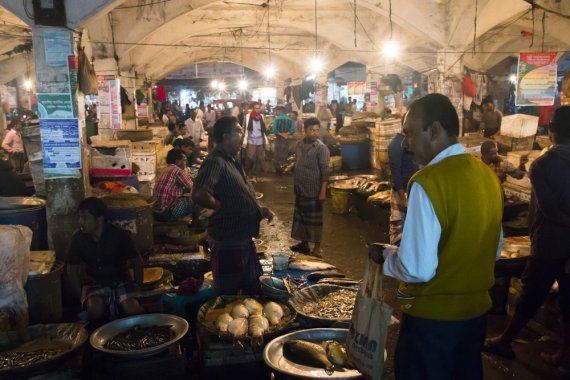Food market in Bangladesh; photo: Shutterstock
The study is part of the research programme Agriculture for Nutrition and Health (A4NH) of the international institutes for agricultural research, CGIAR.
When one speaks of food in countries like Ethiopia, Nigeria, Bangladesh and Vietnam, one usually refers to whether sufficient amounts of grain, rice or maize are available for the population. However, the quality and nutritional value of this food is often a neglected point. A large-scale study by Inge Brouwer with the help of international research institutes is meant to change that. This project does not focus on agriculture in developing countries, but on the consumers. They should be offered a healthy and varied diet in order to ban vitamin and mineral deficiencies, malnutrition and obesity. The project wants to reform the food systems in these countries through healthy diets.
Diagnosis
The researchers will start by diagnosing the existing diets in the four aforementioned countries. This should reveal whether the diet is too monotonous or contains too many unhealthy elements such as sugar, salt, soda and processed foods. To change that into a varied and healthy diet, Brouwer will set up a ‘healthy eating index’. ‘It is similar to a Food Pyramid and is meant to inform consumers how to eat healthily and incite the governments to create health policies’, she explains.
Vegetables
The diet scans have yet to be performed, but Brouwer already knows that the population of the four countries does not eat sufficient amounts of fruits and vegetables. ‘These are insufficiently produced, which means that the production of fruits and vegetables will also need to increase in those countries. Besides that, we will need to solve the problems in the food chain, such as food waste and distribution, but also entice consumers to eat more fruits and vegetables.’
Connections
This diet project requires an integral view of the food system in a country, says Brouwer. ‘There isn’t just a single product on your plate; your meal is the result of a complex food chain. That is why we must thoroughly study the food systems and look at the connections between the farmers, traders, processors and consumers. The inhabitants of Ibadan in Nigeria are connected to both the local and international food systems. They can even buy shrimps from Vietnam! We have to map the connections and considerations in such a food system before we can start aiming for a healthier diet.’
Projects
A total of 24 million dollars has been made available for the research project. Four million each year during a period of six years. Half of the funding will be going to WUR for coordination and research. Brouwer: ‘We will divide the study into about sixty projects and start with three postdocs and three PhD candidates.’ She also wants to involve students. ‘The food system of Ethiopia has already been described in a first paper. That paper leads to 25 research questions. We are now investigating whether Ethiopian and Wageningen students can help answer these. One example of what they could do is follow the food in the chain, from the plate or bowl back to the farmer.’

